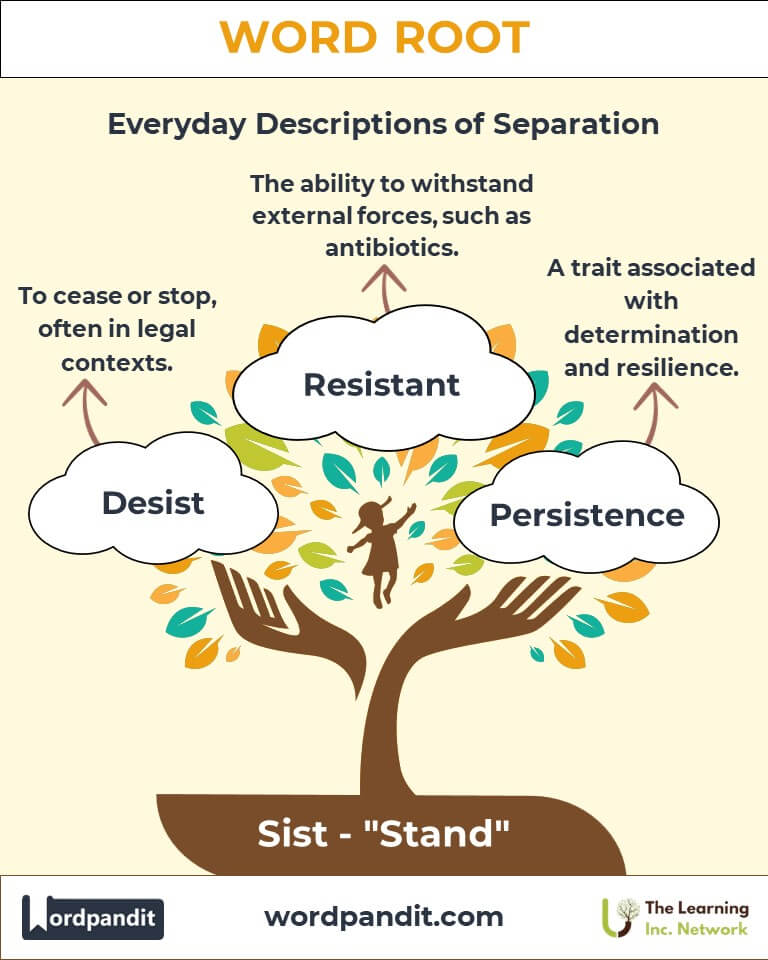Sist: The Root of Standing Firm in Language and Life
Discover the depth of the word root "sist," derived from Latin, meaning "stand." From assisting a friend to persisting through challenges, this root forms the foundation of words that signify support, endurance, and steadfastness.

Table of Contents
- Introduction: The Foundation of "Sist"
- Etymology and Historical Journey
- Mnemonic: Remembering "Sist" with Ease
- Common "Sist"-Related Terms
- "Sist" Through Time
- "Sist" in Specialized Fields
- Illustrative Story: "Sist" in Action
- Cultural Significance of "Sist"
- The "Sist" Family Tree
- FAQs About the "Sist" Word Root
- Test Your Knowledge: "Sist" Word Root Quiz
- Conclusion: The Living Legacy of "Sist"
Introduction: The Foundation of "Sist"
Imagine standing firm in the face of a challenge or supporting a friend through difficult times. The root "sist," pronounced as "sist," comes from the Latin sistere, meaning "to stand or cause to stand." This versatile root appears in numerous English words, emphasizing endurance, assistance, and resilience.

Etymology and Historical Journey
The word root "sist" originates from the Latin sistere, closely tied to the verb stare, which means "to stand." As it evolved, "sist" formed the base of words that represent standing firm, supporting others, or continuing despite adversity. Over centuries, it transitioned into legal, technical, and everyday contexts, enriching English vocabulary.
Mnemonic: Remembering "Sist" with Ease
Picture a supportive pillar holding up a grand arch. The pillar “stands” firm, symbolizing the essence of "sist."
Mnemonic Device:
"Sist stands strong—assist, persist, and insist on resilience!”
Common "Sist"-Related Terms
- Assist (uh-sist): To help or support.
Example: "Volunteers assist the elderly during community events." - Persist (per-sist): To continue steadfastly despite challenges.
Example: "She persisted in her studies, eventually earning a scholarship." - Resist (ri-zist): To oppose or withstand.
Example: "The fortress resisted the invaders for years." - Insist (in-sist): To demand firmly.
Example: "He insisted on completing the project by the deadline." - Desist (de-sist): To cease or stop.
Example: "The court ordered the company to desist from harmful practices."
"Sist" Through Time
- Persist (16th Century): Initially used in religious texts to describe steadfast faith, "persist" later broadened to include perseverance in secular contexts.
- Assist (14th Century): Borrowed from Old French, this term was used in chivalric literature to describe knights aiding comrades.
"Sist" in Specialized Fields
- Law:
Desist: Legal orders often include this term to command cessation of specific actions.
Example: "A desist order was issued to halt the project temporarily." - Medicine:
Resistant: Describes microorganisms' ability to withstand antibiotics.
Example: "The bacteria became resistant to common antibiotics." - Psychology:
Persistence: A trait associated with determination and resilience.
Example: "Persistence is a key predictor of success in therapy."
Illustrative Story: "Sist" in Action
Lila dreamed of becoming an artist but faced numerous setbacks, from financial struggles to critical reviews. Each time, she persisted, drawing strength from her unwavering determination. Friends assisted her by organizing a gallery event, where her work was finally celebrated. Through their combined efforts and her resilience, Lila stood tall, embodying the spirit of "sist."
Cultural Significance of "Sist"
The root "sist" resonates with values of support, endurance, and unity. It appears in motivational phrases like "persist and prevail," underscoring the importance of standing firm. Across cultures, the act of assistance and resistance has shaped societal progress and individual success.

The "Sist" Family Tree
- Stat (stand):
Example: Status (standing or position). - Stit (stand, place):
Example: Constitute (to establish or set up). - Stab (stand firm):
Example: Stable (steady or unchanging).

10. FAQs About " Sist "
Q: What does the root "sist" mean?
A: The root "sist" comes from the Latin "sistere," meaning "to stand" or "cause to stand." It conveys ideas of endurance, support, resistance, or taking a firm position. Words like "persist" and "assist" embody these meanings, emphasizing resilience and aid.
Q: How is "assist" related to the root "sist"?
A: "Assist" means to help or support someone. The connection to "sist" lies in the idea of standing by someone’s side, offering them the stability or support needed to achieve a task or overcome a challenge.
Q: What does "persist" imply in real-life contexts?
A: "Persist" means to continue steadfastly despite difficulty. It reflects the root’s essence of standing firm. For example, an athlete persisting through rigorous training to achieve their goals demonstrates the resilience inherent in the word.
Q: What does "resist" signify?
A: "Resist" means to oppose or withstand. It stems from the idea of standing against something. For example, resisting peer pressure implies taking a firm stand against external influences.
Q: Why is "desist" significant in law?
A: In legal contexts, "desist" means to cease or stop an action, often enforced by a formal order. The word’s root suggests standing still or halting, emphasizing the need to discontinue a prohibited activity.
Q: How does "insist" convey determination?
A: "Insist" means to demand or assert something firmly. The word implies standing unwaveringly by one’s position or opinion, emphasizing persistence in asserting a belief or request.
11. Test Your Knowledge: " Sist " Mastery Quiz
1. What does the root "sist" signify?
2. Which word means to stop an action?
3. What does "assist" mean?
4. What does "persist" imply?
5. Which term describes opposing or withstanding something?
Conclusion: The Standing Legacy of "Sist"
The root "sist" is a testament to the power of standing firm, offering support, and enduring challenges. Its presence in language reflects fundamental human values of resilience and unity. As you encounter words like "assist" and "persist," remember their shared root, inspiring you to stand tall and steadfast in your pursuits.














